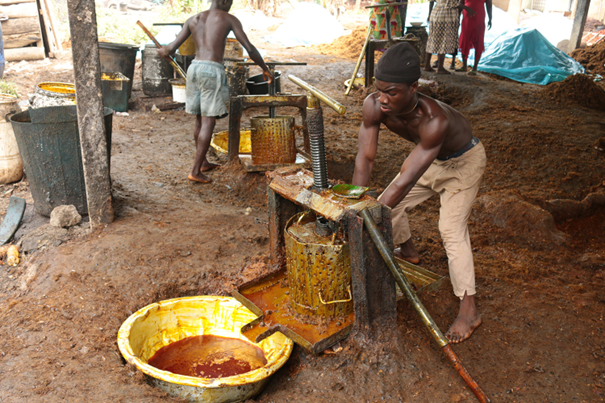This investigation delves into alleged abuses linked to the supply of West African palm oil and rubber to European markets by Belgian company Siat, one of the biggest global providers of both commodities.
In published articles and an upcoming documentary, the cross-border team exposes the problem of land grabbing in Africa through the stories of two communities — in Ivory Coast and Ghana, respectively — whose lands, cultivated by local farmers under customary land tenure, were taken over by Siat.
The cases exemplify large-scale land deals in Africa covering a combined five million hectares or 50,000 square kilometres — an area the size of Slovakia. Nation states act as intermediaries, ceding lands to Siat under long-term lease contracts.
The team of two freelancers proved that the land transfers happened amid corruption, land grabbing and violations of human and labour rights. They led to ecological degradation, loss of food sovereignty and acts of violence and sexual abuse. Local protests and legal claims against the land grabbing resulted in mass arrests, rights violations and even killings.
Part of the investigation focused on a sustainability certification obtained by Siat’s Ghanaian subsidiary from the Roundtable on Sustainable Palm Oil, a global certification system for sustainable palm oil, despite numerous allegations of abuses.
The journalists also investigated the role of Siat in lobbying against the planned EU due diligence directive (and corresponding Belgian legislation). The directive will require all European companies to address environmental and human rights risks across their global value chains and will hold them liable for harms perpetrated.
However, the legislation has so many loopholes (including the exclusion of the rubber industry) that it will likely not prevent abuses such as those committed by Siat in Africa, experts say.
Finally, the team scrutinised how much Siat’s major clients — including Nestle, Unilever, Goodyear and Michelin — know about the company’s abuses and their potential role in lobbying against stricter legislation.
This matters because such companies will have to verify their supply chains and report on environmental, social and governance risks in line with the provisions of the due diligence directive.
See the stories below and stay tuned for the documentary.
Team members
Magdalena Krukowska (Belgium/Poland) has collaborated with Forbes magazine for 15 years. She is a professor of sustainability and journalism and the creator of the films “Mantra of Bhutan”, “Shule Bora” and “War for the Minerals of War”, broadcast by VOD.pl, TVN24 and forbes.pl, among others. She also directed the documentary “New City” about land grabbing in the Philippines.
Zuza Nazaruk (Netherlands/Poland) is a Rotterdam-based journalist covering climate and the environment. She is a BIRN Fellow for Journalistic Excellence, a fellow with the Civil Forum on Asset Recovery and with International Journalists’ Programme. Her multimedia reporting has appeared in Euronews Green, Unbias the News, DutchNews, Vers Beton, Kyiv Post, Gazeta Wyborcza, ENTR (France24), Equal Times, and more, in seven languages.
